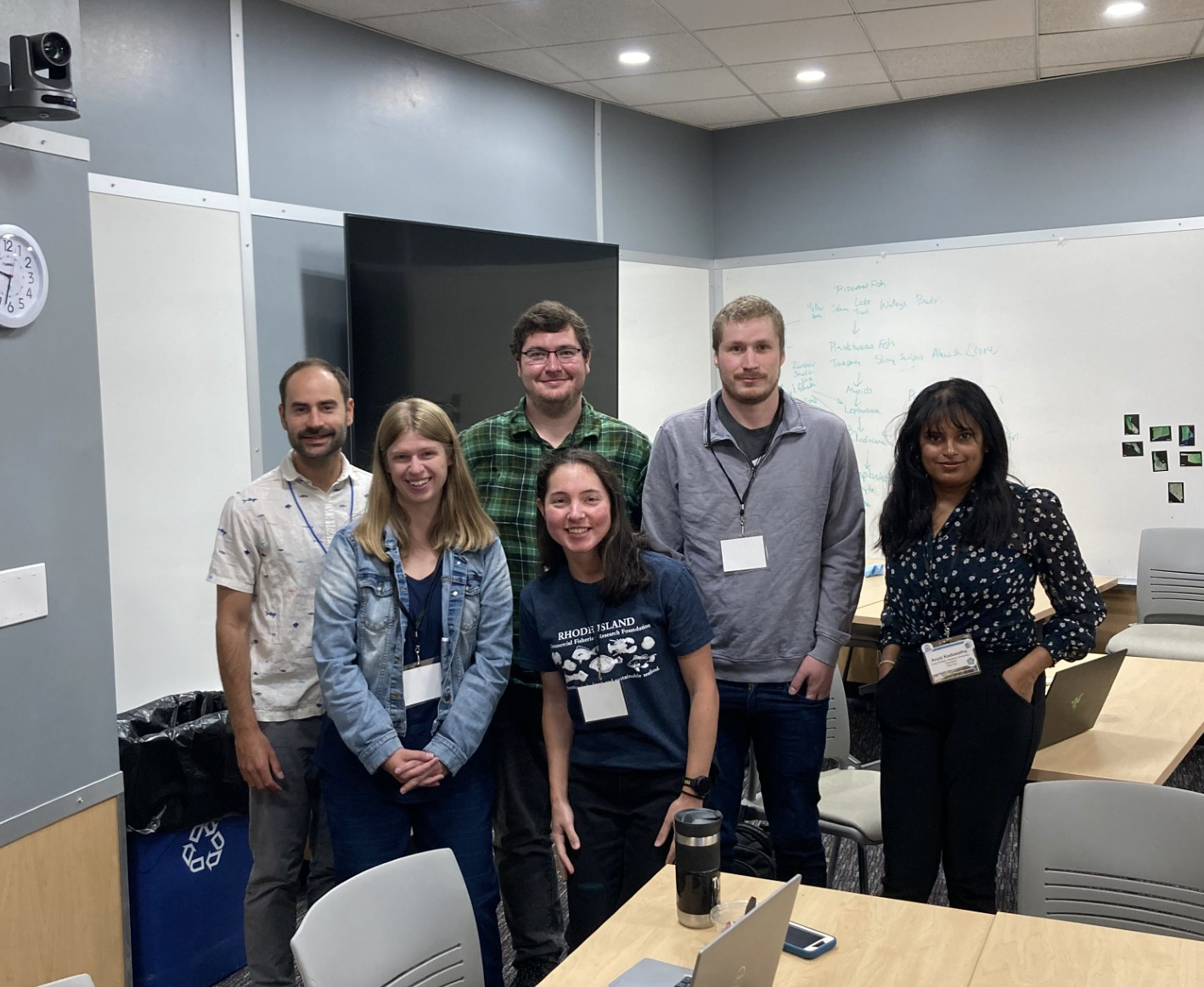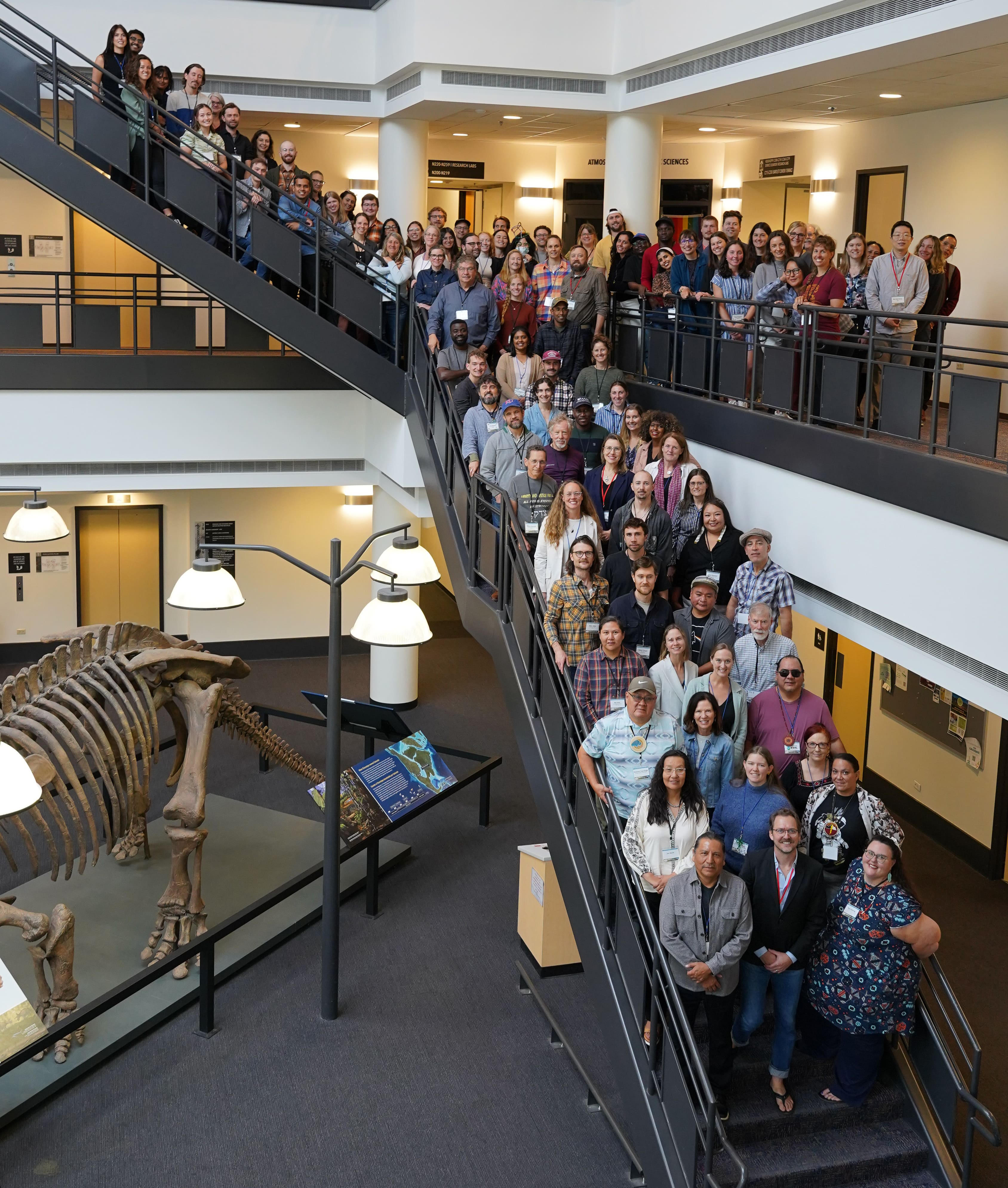The Open Bioinformatics Foundation (OBF) Event Fellowship program aims to promote diverse participation at events promoting open-source bioinformatics software development and open science practices in the biological research community. Ruby Krasnow, a PhD student at the University of Maine, was awarded an OBF Event Fellowship to attend the 2025 ESIIL Innovation Summit.
 My team (Group 4) from the 2025 ESIIL Innovation Summit.
My team (Group 4) from the 2025 ESIIL Innovation Summit.
Introduction
Thanks to the support of an OBF Event Fellowship, I attended the 2025 Environmental Data Science Innovation & Impact Lab (ESIIL) Innovation Summit in Boulder, Colorado. An annual event, this year’s ESIIL Summit had the following goals:
- Explore big data to understand environmental tipping points and transformations by identifying data synthesis opportunities and utilizing ESIIL cloud-compute capabilities.
- Promote best practices in ethical, open science by supporting accessibility and usability of environmental data by all stakeholders.
- Champion ethical practices in environmental science, and encourage the responsible use of AI.
- Support teams by establishing collaborations around data-inspired themes across different disciplines, sectors, and career stages.
 Summit participants at the Sustainability, Energy and Environment Community (SEEC) building, part of the University of Colorado Boulder.
Summit participants at the Sustainability, Energy and Environment Community (SEEC) building, part of the University of Colorado Boulder.
The Summit was designed as an “unconference,” where much of the time was dedicated to forming teams that each tackled a specific research question related to understanding and predicting environmental tipping points and working in those teams to begin a collaborative project that ideally lasts far beyond the end of the in-person gathering. This event was a remarkable opportunity to meet and collaborate with other scientists from a variety of backgrounds.
I learned a great deal about the conference theme as well as the open-source software tools that support the use of big data to answer questions related to the environmental transformations or disturbances. The topics chosen by the groups were extremely diverse, such as:
- Examining how hydrology, governance, and management interact within and across the Snake, Green, and Wind River Basins in the western U.S. - Synthesizing forest management and intervention strategies that can mitigate the impacts of linked disturbances (e.g., drought, windstorm, wildfire, and insect/pathogen disturbances).
- Creating a dashboard and interactive search tool for tribal decision-makers to access and understand meaningful information about extractive activities in the HeSapa (Black Hills) through >2,400 Environmental Impact Statement/Assessment documents from the U.S. Forest Service, Bureau of Land Management, and other agencies.
- Evaluating how the order, duration, frequency, and intensity of disturbances affect the likelihood of regime shifts from forests to nonforests.
- Tackling broad questions about how to ensure greater data interoperability within the environmental data science community.
My team chose to focus on environmental tipping points within freshwater food webs, exploring how the stability and resilience of food webs might be affected by—or serve as an early warning signal for—environmental tipping points or “regime shifts.” As an initial case study, we concentrated on Lake Champlain, a relatively data-rich system that one of our team members, Dr. Alyssa Gleichsner, knows well.

 Preliminary drafts of a simplified food web of the Lake Champlain ecosystem, with more (left) or less (right) abstraction of individual species into trophic groups. Dates in parentheses in the right figure indicate the year of first appearance for invasive species.
Preliminary drafts of a simplified food web of the Lake Champlain ecosystem, with more (left) or less (right) abstraction of individual species into trophic groups. Dates in parentheses in the right figure indicate the year of first appearance for invasive species.
ESIIL staff encouraged us to use reproducible data analysis workflows from the very beginning of our project. Each team received a template GitHub repository to track progress and share code, which we used when presenting our initial results during report-back sessions to all participants. Looking ahead, we plan to submit a proposal to form an ESIIL working group, which would provide additional support to expand this project’s scope and impact. Whether or not we receive funding, we aim to publish an open-access paper describing our results. In keeping with OBF and ESIIL’s open science ethos, we will publish our data and code alongside the paper so other researchers can reproduce, reuse, and extend our analysis to other freshwater systems.
In addition to the time spent in working groups, the Summit featured several keynote presentations, including discussions on causal inference to identify climate impacts on ecological systems, predicting and managing ecological transformations in climate-adapted landscapes, and the use of AI in environmental data science. Perhaps the most meaningful aspect of the event was the emphasis on learning from and co-creating knowledge with the Indigenous peoples whose land we live and work on.
It was impossible not to be moved by the words of the Indigenous leaders present at the Summit, who spoke about the deep connection we have to every part of the natural world and our responsibility to honor and protect the land, water, and life around us. Although I was aware in an academic sense of Traditional Ecological Knowledge (TEK) and efforts to incorporate TEK with traditional western science, the Summit was the first place I’ve experienced it in action, and it was very powerful to see how diverse ways of knowing can be weaved together to support environmental protection and management efforts.

 Pictures of the mountains in Boulder and a grazing mule deer taken while walking to the University of Colorado Boulder East Campus, where the Summit was held.
Pictures of the mountains in Boulder and a grazing mule deer taken while walking to the University of Colorado Boulder East Campus, where the Summit was held.
In many ways, the Summit showed me the value of diversity in scientific communities and the importance of community itself in maintaining hope and joy when facing immense challenges. Having learned more about ESIIL and its core values, I see many similarities with OBF, and I hope that OBF’s support of my participation in this ESIIL event will be only one of many examples of collaboration between the two organizations.
Acknowledgements
“Thank you to my Group 4 team members and to the OBF Event Fellowship for supporting my travel to the 2025 ESIIL Innovation Summit!”